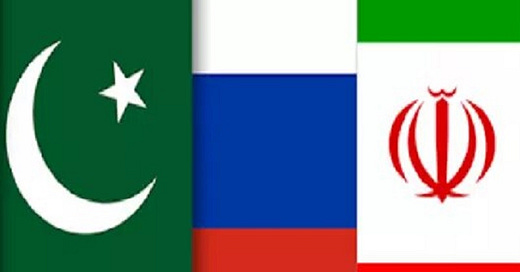Pakistan is on the horns of a painful dilemma whereby its energy security, which must be ensured in the most cost-effective way possible in order to begin sustainably resolving its economic-financial crises, is nowadays under the influence of the US’ sanctions regimes.
Russian Deputy Prime Minister Alexander Novak told TASS in an extended interview that was published on Monday that the possibility exists for an Iranian gas swap with Pakistan. He also suggested expanding current infrastructure in Central Asia to Afghanistan and that neighboring South Asian state, though this scenario appears unlikely to unfold any time soon owing to the dangerous Pakistani-Taliban security dilemma. It’s therefore worth exploring the first option, but only if Pakistan has the political will.
The US-orchestrated post-modern coup in that country in early April neutralized Pakistan’s previously promising geostrategic potential in serving as the “Zipper of Eurasia” amidst the global systemic transition to multipolarity. In response to the newly installed regime’s decision to return their country to its traditional role as a US vassal, Russia was forced to recalibrate its grand strategy by replacing Pakistan with Iran as the envisaged top partner in its “Ummah Pivot”.
Even so, the reassertion of American influence over Pakistan hasn’t (yet?) been absolute as proven by its proxy’s refusal to publicly condemn Russia at the UN and its decision to dispatch officials to Moscow last month to negotiate an energy deal between them. “Pakistan’s Unrealistic Demand Doomed Its Oil Talks With Russia”, but Moscow still appreciates the importance of its non-traditional partner’s growing energy market and therefore remained committed to hopefully reaching some kind of agreement.
To that end, Novak just shared his two proposals with TASS for how Russia could export gas to Pakistan. Since construction of a trans-Afghan gas pipeline is unrealistic for the foreseeable future and would take a lot of time to develop in any case, the only viable option is to organize an Iranian gas swap. This could be accomplished in a comparatively much quicker time frame, but only if Pakistan has the political will to do so, which remains unclear due to the US’ restored influence over Islamabad ever since early April.
After all, this South Asian state would certainly risk the US’ sanctions wrath seeing as how Biden declared in a newly surfaced video that the JCPOA is “dead”, which means that its unilateral sanctions against Iran won’t be lifted. Pakistan is therefore on the horns of a painful dilemma whereby its energy security, which must be ensured in the most cost-effective way possible in order to begin sustainably resolving its economic-financial crises, is nowadays under the influence of the US’ sanctions regimes.
Islamabad can’t purchase oil from Moscow above Washington’s price cap without provoking its sanctions wrath, the same as it can’t purchase gas from Tehran either without also being punished. For all intents and purposes, Pakistan’s economic-financial recovery hinges on resolving this predicament since only Russia and Iran can provide the cost-effective means for ensuring its energy security as the first step to that country’s sustainable structural recovery, yet its leadership is politically paralyzed.
Former Prime Minister Imran Khan previously declared that he’d have prioritized Pakistan’s objective national interests in the face of foreign pressure exactly like neighboring India has impressively done, yet it was precisely due to his multipolar mindset that the US conspired with local proxies to oust him. In the absence of visionary leadership and the political will to take requisite risks in pursuit of these selfsame interests, Pakistan might once again miss yet another opportunity for fixing its many problems.





How can i Translate in Nederland's.. Language pls